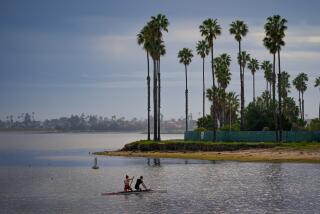Jackson Drive
- Share via
In a Feb. 17 commentary (“Sweet and Sour Art of Negotiation”), Lori Saldana suggests that environmentalists could be more effective through negotiations with developers. Many environmental organizations already participate quite actively in discussions on development policy and specific projects. While environmentalists could probably chase after every developer in the county trying to redesign their projects, that is not what their memberships expect of them.
Ms. Saldana does not appear to have a good grasp of the tremendous work that environmental activists and conservationists are already doing--from advancing alternatives such as water resource plans that promote water use efficiency to enforcing the community and general plans that the public should already be able to rely on to focus growth and protect irreplaceable natural resources.
Indeed, some of the examples cited as successes achieved by a triad of developers, politicians and environmentalists “working together . . . in 1990,” such as the protection of Famosa Slough, were the culmination of years of struggle and persistence by individuals and organizations.
The main thesis of the commentary, that the extension of Jackson Drive through Mission Trails Regional Park should somehow be a “case in point” for cooperative implementation between this same triad, is predicated on a series of assumptions so obviously inaccurate that one can only conclude that Ms. Saldana does not fully appreciate the magnitude of this project as spelled out in the city’s own environmental impact report.
The suggestions to improve the project, while laudable in their intent, are either insufficient, infeasible, unnecessary, illegal or would result in more adverse impacts than the project already approved by the City Council.
The real issue is not whether the project can be sugar-coated with positive amendments, but whether it represents the best interests of the people of San Diego. If a project the size of Jackson Drive is truly necessary and worth the conversion of parklands, it should be able to withstand the test of direct public approval.
If the “environmental community” were playing on a level political field and starting with a clear slate of an undisturbed region, the ideals expressed by Ms. Saldana for constructive cooperation might be more feasible. But that is not the situation. It is the responsibility of the environmental community to pursue all feasible avenues for protection of our irreplaceable and rapidly diminishing natural resources, not to engage prematurely on a course of accommodation.
JAY POWELL, San Diego. Jay Powell is a member of San Diegans for Managed Growth, sponsors of the “Parks and Wildlife Protection Initiative.”
More to Read
Sign up for Essential California
The most important California stories and recommendations in your inbox every morning.
You may occasionally receive promotional content from the Los Angeles Times.













